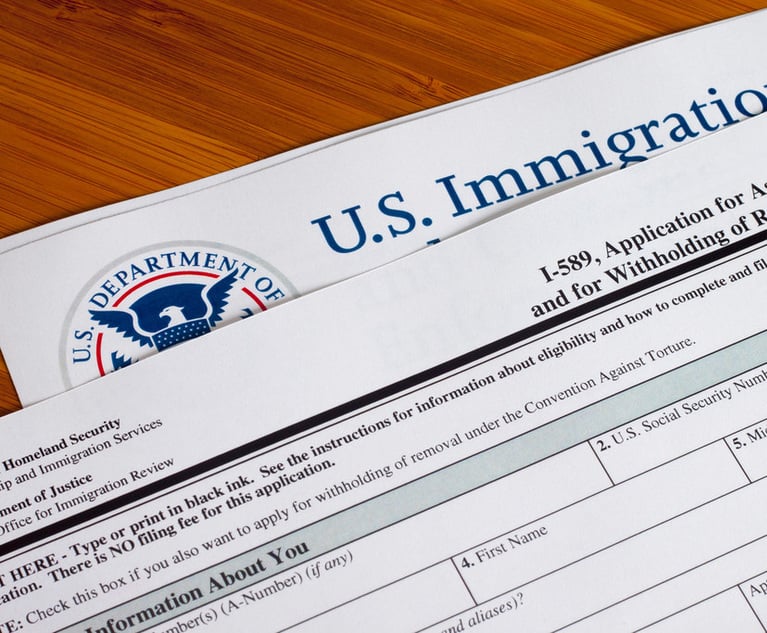7 Cases to Come Before Connecticut Supreme Court in March Session
The Connecticut Supreme Court will hear seven cases, weighing issues from custody to free speech matters to bankruptcy appeals.
March 18, 2019 at 02:43 PM
6 minute read
 Connecticut Supreme Court in Hartford. Courtesy photo.
Connecticut Supreme Court in Hartford. Courtesy photo.
From legal questions on bankruptcy matters to whether expert testimony is needed to establish the standard of care for a child who was assaulted at school, the Connecticut Supreme Court will weigh at least seven cases for its seventh session.
The court's seventh of eight terms begins on March 25, when the justices will hear oral arguments in all of the cases in the court's chambers in Hartford.
Here are some of the more notable cases:
Osborn v. City of Waterbury
The state's high court will decide whether the Connecticut Appellate Court properly determined that expert testimony in a school assault case was required to establish proper standards of care.
Tatayana Osborn brought a personal injury action against the city of Waterbury and the Waterbury Board of Education after her child was assaulted during a lunchtime recess at an elementary school. Following a trial, the court ruled in favor of the plaintiffs and against the city and the board, finding the child's injuries were the result of the board's failure to provide adequate staff to supervise and control other students during recess.
The defendants appealed, arguing the trial court erred in finding, in the absence of expert testimony, that one student intern and three or four staff members were insufficient to control as many as 400 students during recess. The Appellate Court reversed the trial court's ruling and remanded the case with direction to render a judgment for the defendants.
The court held that the plaintiffs were required to present expert testimony as to the relevant standard of care, and to prove that the number of staff on the playground supervising the children at the time the child was assaulted constituted a breach of that standard of care. The plaintiffs appealed to the state's high court. The Supreme Court agreed to hear the matter and will also address whether the plaintiffs received adequate notice that they needed to present expert testimony.
Re: Teagan K-O
The state's high court will look into a case involving parental rights and the role that the Connecticut Department of Children and Families can play.
At issue are parents Cassandra D. and Gary O., who have three children together. Their first two children were ordered committed to the care and custody of DCF. When Cassandra was pregnant with her third child, the couple moved to Florida and Teagan was born in that state. Days after the girl's birth, DCF filed a petition in the Superior Court for Juvenile Matters at Waterford alleging Teagan was being neglected.
Florida authorities then said that jurisdiction over Teagan be transferred to the Connecticut court, maintaining that Connecticut was a better forum given the parents' long and ongoing history with DCF. Soon after, DCF was granted temporary custody of the baby, who was transported to Connecticut and placed in a foster home with one of her siblings.
The father filed a motion to dismiss the neglect petition and claims that there was no legal basis for his child, born in Florida, to be taken to Connecticut and placed in a foster home.
Metcalf v. Fitzgerald
Jonathan Metcalf brought a vexatious litigation claim under both state statute and common law against defendants Ion Bank and its employee, Michael Fitzgerald, and against the bank's lawyer and his law firm.
Metcalf alleged the defendants maliciously, and without cause, brought an adversary proceeding in his bankruptcy case in which they objected to the general discharge of his debt on the grounds that he transferred or concealed property in order to defraud creditors.
The trial court dismissed Metcalf's claim for lack of subject-matter jurisdiction, finding federal law pre-empted the vexatious litigation claim in accordance with Lewis v. Chelsea G.C.A. Realty Partnership.
Metcalf appealed the dismissal, arguing that the Lewis court was wrongly decided and should be overruled. Metcalf noted there is a split among jurisdictions as to whether federal law is pre-empted from claims of malicious prosecution or vexatious litigation stemming out of alleged misconduct occurring during bankruptcy. The state Supreme Court will decide the matter.
State v. Liebenguth
The state's high court was set to rule last month on a free speech matter, but the case was delayed and will now be heard later this month.
The Connecticut Supreme Court will rule on whether the Connecticut Appellate Court properly concluded that, under the circumstances in which they were uttered, racial slurs directed at a black parking officer were not so-called fighting words.
Under the U.S. Constitution's First Amendment, “fighting words” are not constitutionally protected as free speech, as they are likely to provoke the target, cause injury or incite a reaction.
In this case, following a bench trial, David Liebenguth was convicted of second-degree breach of peace in violation of the state's General Statutes, which prohibit the use in public places of abusive or obscene language intended to cause annoyance or alarm.
Liebenguth's conviction stemmed from an incident in which he twice directed racial slurs at a black parking officer who had just issued him a $15 ticket. He made several vulgar and racially charged remarks during the incident, culminating in angrily shouting a racial slur at the parking officer while driving past him.
The trial court found that Liebenguth's speech, taken in context, amounted to “fighting words,” but Liebenguth countered it was protected speech under the U.S. Constitution.
The state Appellate Court agreed with Liebenguth and reversed the conviction. It found that while the words used were vulgar, they were not likely to provoke a reasonable person into taking violent action. The state then raised a challenge before the state's high court.
Read more:
20 Cases to Come Before Connecticut Supreme Court in February Session
This content has been archived. It is available through our partners, LexisNexis® and Bloomberg Law.
To view this content, please continue to their sites.
Not a Lexis Subscriber?
Subscribe Now
Not a Bloomberg Law Subscriber?
Subscribe Now
NOT FOR REPRINT
© 2025 ALM Global, LLC, All Rights Reserved. Request academic re-use from www.copyright.com. All other uses, submit a request to [email protected]. For more information visit Asset & Logo Licensing.
You Might Like
View All


Trump Administration Faces Legal Challenge Over EO Impacting Federal Workers
3 minute read
Settlement Allows Spouses of U.S. Citizens to Reopen Removal Proceedings
4 minute readTrending Stories
- 1Thursday Newspaper
- 2Public Notices/Calendars
- 3Judicial Ethics Opinion 24-117
- 4Rejuvenation of a Sharp Employer Non-Compete Tool: Delaware Supreme Court Reinvigorates the Employee Choice Doctrine
- 5Mastering Litigation in New York’s Commercial Division Part V, Leave It to the Experts: Expert Discovery in the New York Commercial Division
Who Got The Work
J. Brugh Lower of Gibbons has entered an appearance for industrial equipment supplier Devco Corporation in a pending trademark infringement lawsuit. The suit, accusing the defendant of selling knock-off Graco products, was filed Dec. 18 in New Jersey District Court by Rivkin Radler on behalf of Graco Inc. and Graco Minnesota. The case, assigned to U.S. District Judge Zahid N. Quraishi, is 3:24-cv-11294, Graco Inc. et al v. Devco Corporation.
Who Got The Work
Rebecca Maller-Stein and Kent A. Yalowitz of Arnold & Porter Kaye Scholer have entered their appearances for Hanaco Venture Capital and its executives, Lior Prosor and David Frankel, in a pending securities lawsuit. The action, filed on Dec. 24 in New York Southern District Court by Zell, Aron & Co. on behalf of Goldeneye Advisors, accuses the defendants of negligently and fraudulently managing the plaintiff's $1 million investment. The case, assigned to U.S. District Judge Vernon S. Broderick, is 1:24-cv-09918, Goldeneye Advisors, LLC v. Hanaco Venture Capital, Ltd. et al.
Who Got The Work
Attorneys from A&O Shearman has stepped in as defense counsel for Toronto-Dominion Bank and other defendants in a pending securities class action. The suit, filed Dec. 11 in New York Southern District Court by Bleichmar Fonti & Auld, accuses the defendants of concealing the bank's 'pervasive' deficiencies in regards to its compliance with the Bank Secrecy Act and the quality of its anti-money laundering controls. The case, assigned to U.S. District Judge Arun Subramanian, is 1:24-cv-09445, Gonzalez v. The Toronto-Dominion Bank et al.
Who Got The Work
Crown Castle International, a Pennsylvania company providing shared communications infrastructure, has turned to Luke D. Wolf of Gordon Rees Scully Mansukhani to fend off a pending breach-of-contract lawsuit. The court action, filed Nov. 25 in Michigan Eastern District Court by Hooper Hathaway PC on behalf of The Town Residences LLC, accuses Crown Castle of failing to transfer approximately $30,000 in utility payments from T-Mobile in breach of a roof-top lease and assignment agreement. The case, assigned to U.S. District Judge Susan K. Declercq, is 2:24-cv-13131, The Town Residences LLC v. T-Mobile US, Inc. et al.
Who Got The Work
Wilfred P. Coronato and Daniel M. Schwartz of McCarter & English have stepped in as defense counsel to Electrolux Home Products Inc. in a pending product liability lawsuit. The court action, filed Nov. 26 in New York Eastern District Court by Poulos Lopiccolo PC and Nagel Rice LLP on behalf of David Stern, alleges that the defendant's refrigerators’ drawers and shelving repeatedly break and fall apart within months after purchase. The case, assigned to U.S. District Judge Joan M. Azrack, is 2:24-cv-08204, Stern v. Electrolux Home Products, Inc.
Featured Firms
Law Offices of Gary Martin Hays & Associates, P.C.
(470) 294-1674
Law Offices of Mark E. Salomone
(857) 444-6468
Smith & Hassler
(713) 739-1250










